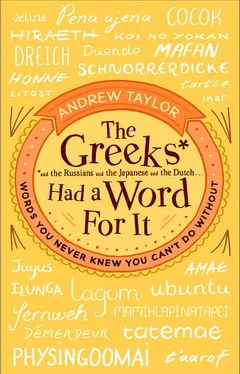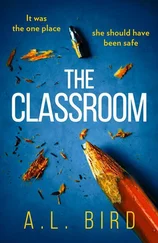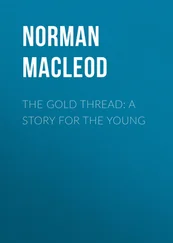The traditional English stereotype is all about firm handshakes and a stiff upper lip rather than anything so emotional as hygge . But an Englishman might protest that it’s easy to misinterpret what seems to be a brusque and buttoned-up handshake. Ruffling your child’s hair as he’s about to set off for his first day at school, gripping the hand of your son as he boards a plane for a long journey, or squeezing your daughter’s arm before you walk down the aisle with her – these could all be very hygge moments indeed. We certainly experience it. And now we have a word for it.
Torment caused by an acute awareness of your own misery and the wider suffering of humanity in general
The Czech Republic sits at the vulnerable, much-fought-over centre of Europe. Through the last century, the history of the region was largely one of invasion, occupation, tyranny and bloodshed. Under the Nazis in 1939, vast swathes of Czech territory were incorporated into Hitler’s ‘Greater Germany’ – part of the price Britain and its allies were prepared to pay for Neville Chamberlain’s tragic boast of ‘peace for our time’. The occupation that followed was bloody and brutal, and so was the liberation. They were followed at the end of the Second World War by a second dismemberment, this time by the Soviet Union, and then forty years of Communist repression, with the brief flowering of the Prague Spring ruthlessly crushed by tanks in 1968.
It’s little wonder, with a history like that, that the Czechs should have come up with a word like litost ( LEE-tossed ).
It is, according to the Czech writer Milan Kundera, ‘a state of torment caused by the sudden sight of one’s own misery’. In his novel The Book of Laughter and Forgetting , [11] Milan Kundera, The Book of Laughter and Forgetting (New York: Knopf, 1980).
he notes that the long first syllable sounds ‘like the wail of an abandoned dog’. Love may be a cure for litost , but when the first passionate flush of idealized desire is past, love can also be a source of it. The emotion is, he says mischievously, a torment that is particularly felt by the young, since anyone with any experience of life will know how commonplace and tedious his own self-regarding misery is.
But that’s only part of the story. As a novelist, Kundera focuses on the individual – on the student in his novel wallowing in his own unhappiness, for instance. Litost , however, can also be a more wide-ranging feeling, a concentration on our misery rather than my misery. It could be a sudden emotional awareness of the unfitness of things – a realization of the indiscriminate way that death was meted out in the Yugoslav civil wars, of the tsunami-like disaster of the Holocaust crashing down on Europe, or of the succession of miseries that have afflicted the region where the Czechs live. It doesn’t have to be as inward-looking as Kundera suggests. But he’s correct to point out that it’s generally a negative or unproductive emotion that is often followed by the desire for revenge. The rape of Czechoslovakia by the Nazis was followed by the murder of innocent German-speaking civilians at the end of the war.
According to Kundera, litost may be dissipated in extreme circumstances by suicide, by violence against the person who has inspired it, or even by provoking them to kill you. For most of us, then, it’s definitely not an emotion to be encouraged, since violence, injury and self-destruction are not generally viewed as desirable outcomes.
There is nothing to joke about in the misery of depression, which can strike suddenly, unpredictably and brutally. But litost seems somehow self-regarding and posturing, almost like the existential angst of a teenager. Even when litost is more wide-ranging, focusing on shared misery, it is still all about the effect of that misery on me . Thinking of those who die in conflicts, or the victims of the Holocaust, and agonizing over how unhappy they make you feel, seems to lose sight of the point.
There is no English equivalent even though the word describes a state of mind that is more common than we would like to believe. Perhaps we need the word in the language, if only to do our best to avoid the emotion it describes.
The longing, or need, to be far away – anywhere else
It was a long way from home, but there was no doubting his accent. The young man behind the bar in Auckland looked every inch a Kiwi, with his tattooed arms and his All Blacks T-shirt, but his voice said ‘West Midlands’. So we exchanged a couple of words as he drew my pint.
‘Gap year?’ I asked, and he paused for a moment. There was a long, slow grin, and he raised one eyebrow quizzically.
‘Gap life, with a bit of luck,’ he replied.
The old idea of a gap year as a character-forming break between school and university or between university and the world of work has changed. Now there are sixty-somethings setting off around the world, selling their homes or blowing their pension funds to pay for the journey. And among the youngsters who still make up the vast majority, one year often isn’t enough. More and more of them, unenthused by the idea of returning home to fight for insecure jobs in an economy that doesn’t seem to want them, are thinking rather of two years, or even more. ‘Gap life, with a bit of luck.’
At a time like this we need a word like Fernweh ( FAIRN-vee ).
It’s a German word that goes back to the twelfth or thirteenth century, and it translates literally as ‘far-sickness’ – the opposite of Heimweh , or ‘home-sickness’. It’s a desire to travel – not to anywhere in particular, but just to get away, to leave your familiar surroundings and hit the open road. It might last a few months or a few years, or it might consume the rest of your life, but you know that the only way to find yourself is to find new places, new horizons, new experiences. It could describe the feelings of those young and old gap-lifers alike.
Except that there is a darker side to Fernweh . The vast majority of travellers set off with a song in their hearts, a joyful wish to get to wherever it is they are going and then perhaps move on again. They are motivated primarily by an optimistic wish to see what the world has to offer. For them, the more familiar wander-lust (another word originally from Germany) might be adequate – as it is for many English translators searching for a suitable rendition of Fernweh .
It might last a few months or it might consume the rest of your life.
The word Fernweh was infused with the spirit of the German Romanticism of the early nineteenth century – and, like many of the Romantics themselves, it had a bleak, obsessive edge to it. Without travel, a person who experienced Fernweh would feel an overwhelming lassitude, a sadness, a sense of depression that could all too easily develop into a suicidal longing for the last long journey of all. The difference between wanderlust and Fernweh is the difference between enjoying a few convivial drinks with your friends and drinking alone, long into the night, because you have to.
Dadirri
(Ngangikurungkurr, Australia)
Contemplation of one’s place in the world, involving wonder and humility
The many languages of the Australian Aboriginals are particularly rich in their evocation of the sounds, smells, sights and textures of the natural world, and it’s easy to see why. Throughout their 40,000-year history, the Aboriginal peoples have lived in close proximity to the land, and their very survival has depended on their ability to distinguish between one tree and another, to read the likely weather from particular cloud formations, or to recognize specific sounds in the Australian bush.
Читать дальше












